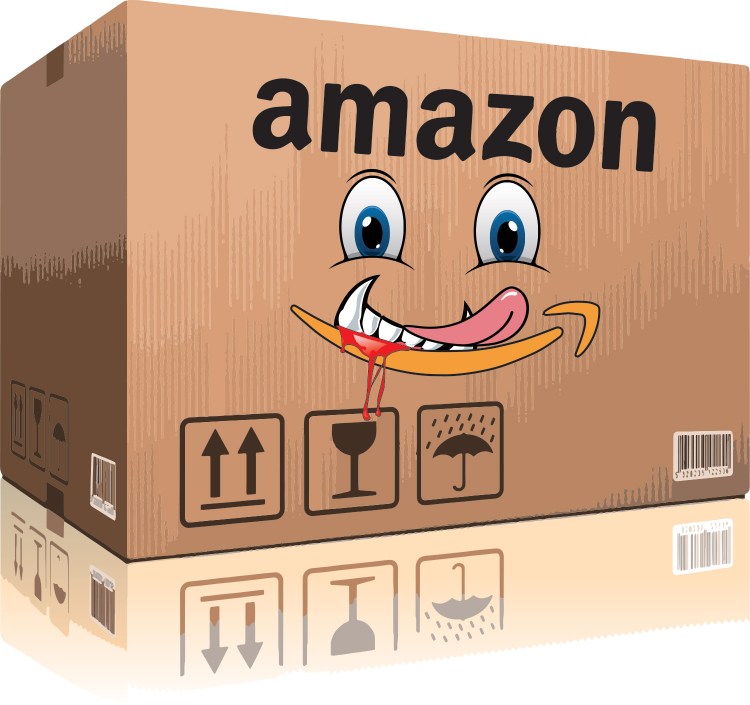Small businesses are a pillar of capitalism and of a healthy economy. They provide a path into the middle and upper-middle class for people who don’t have elite connections or a fancy college degree. And they distribute capital income broadly, so that the gains from business ownership aren’t concentrated among a few wealthy shareholders.
Retail is a big component of small business. In recent decades, big chains have pushed out mom-and-pop stores. But there has been hope that e-commerce would provide a lifeline for small retailers.
There’s just one problem. E-commerce in the U.S. is increasingly dominated by a single platform – Amazon.com Inc. As of 2018, the e-commerce giant had grabbed about half of the online retail market:
That wouldn’t necessarily be a problem for small retailers if Amazon simply provided a venue that allowed small businesses to connect with customers. But increasingly, Amazon makes its own private-label products that compete with the offerings of independent merchants on its platform.
(Disclosure: I own a very small stake – less than 1 percent – in a very small company that Amazon so far has ignored.)
This is a classic tactic used by supermarkets – observe which products sell well, then introduce private-label brands to try to grab some of those markets. But technology has given online platforms superior tools to outcompete their suppliers.
One of these tools is search. Customers look for products using Amazon’s internal search function. Independent sellers can try to take sales from rivals by buying placements in the search results for a rival’s brand-name product – for example, when a customer searches for Purina dog food, she might see a promoted result for Kibbles ‘n Bits. But Amazon doesn’t allow other sellers to compete with its private-label products this way – if you search for an Amazon product, you’ll see an Amazon product first and nothing else. If you search for the other company’s product, however, you might see an Amazon product promoted at the top of the list. And Amazon also collects potentially crucial sales and marketing data that it can choose not to share with third-party merchants.
Of course, any online retailer could do the same. But the world of e-commerce is subject to stronger network effects. When you buy something from a brick-and-mortar retailer, you tend to go to one that’s conveniently located, whether it’s a Walmart, a Best Buy or a local convenience store. But online, unless you’re searching for a specialized product, there’s often no reason to go anywhere but Amazon. This naturally tends to push the platform market toward winner-take-all. And it’s exacerbated by Amazon’s practice of requiring merchants not to offer their products more cheaply on any other platform – a type of agreement known as a most-favored nation provision. This means that merchants who want to sell their products online have no choice but to be on Amazon and play by its rules.
So if Amazon is chewing up the small-business world – and the e-commerce world in general – what’s to be done? One approach is to identify and ban Amazon’s specific anticompetitive practices, as European authorities are trying to do in the case of data sharing. Another approach is to try to introduce competition into the e-commerce platform space by banning most-favored nation provisions and other anticompetitive practices. But these efforts may be inadequate, since the former involves a continuous cat-and-mouse game between regulators and Amazon, and the latter probably won’t be enough to overcome the network effect driving the concentration of online retail.
Another alternative, of course, is simply to break up Amazon. But before such a drastic step is taken, economist Hal Singer argues, antitrust authorities should consider a gentler alternative – a nondiscrimination regime. This would basically allow any third-party merchant to lodge a complaint with the Federal Trade Commission or another independent tribunal. Although only larger merchants would have the resources to lodge such complaints, any victories they won would benefit smaller businesses as well, by curbing Amazon’s anticompetitive stratagems.
As e-commerce becomes a more important part of the U.S. retail landscape, questions like this will inevitably become more pressing. If small businesses are to survive in the digital age, the online economy can’t be allowed to be winner-take-all.
Copy the Story Link
Send questions/comments to the editors.



Success. Please wait for the page to reload. If the page does not reload within 5 seconds, please refresh the page.
Enter your email and password to access comments.
Hi, to comment on stories you must . This profile is in addition to your subscription and website login.
Already have a commenting profile? .
Invalid username/password.
Please check your email to confirm and complete your registration.
Only subscribers are eligible to post comments. Please subscribe or login first for digital access. Here’s why.
Use the form below to reset your password. When you've submitted your account email, we will send an email with a reset code.